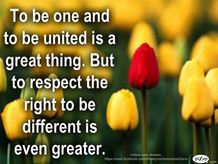 Singing R-E-S-P-E-C-T silently in your head or belting it out loud while channeling Aretha's awesome vibe is not a necessary component to understanding this post; however, just to be clear, it has been running through my head the whole time I have been writing this. Within last week’s post, I mentioned briefly that kids need to be respected so that they learn how to respect others. While reflecting on that piece later, I realized that the word “respect” is often misunderstood and even harder to define. The thesaurus offers “obedience,” “regard,” “esteem,” “honor,” and “adoration” as synonyms. In my mind these equivalent words provide three different versions of respect. The respect that is commanded, as in “I demand respect in my household,” is “obedience.” There is mutual respect, where each person is equal with-in the relationship. In other words we “regard,” “honor,” and hold each other in “esteem.” And then there is worshipful respect, where “adoration” is projected onto another person (often a celebrity), generally from afar. Two of those variations reflect power and/or inequality. When someone demands anything, they are a bully. There really is no other way to describe a person who insists that everyone do things their way, listen to them, and perform as expected. Sometimes this is achieved through subtle influence, and other times it is “in your face” pressure. This definition may seem pretty ruthless, simplistic, or even a bit naive; however, this is my personal interpretation. To worship someone from a distance is problematic in that the object of adoration has no opportunity to reflect that respect back, so it is by definition an unequal “relationship.” We can, however, respect and appreciate the work of influential people without attaching idolatry. I would like to argue that the only healthy form of respect is mutually offered and shared because it is a relationship based on conversation, which involves listening closely to each other. We don't always have to agree, but to have a true connection both parties need to have an open-minded willingness to accept and validate the other person's point of view. For children to learn respect, they need to be heard. They need to be a partner, an equal in the relationship. Children intuit when someone truly cares about their opinion. When they feel acceptance as an individual, they are then able to interact with others with empathy, humility, and honesty. On the other end, if they are unfairly influenced, manipulated, or bullied and told what, how, and when to do everything, they learn how to be resentful, angry and disengaged. A world filled with happy, engaged, and respectful kids would be a wonderful place indeed.
1 Comment
|
|
© 2024 Whole Learners, Inc. 501(c)3
Deep Root Center
48 Riverside Drive, Canton, NY 13617
315*323*1435/[email protected]
Deep Root Center
48 Riverside Drive, Canton, NY 13617
315*323*1435/[email protected]



